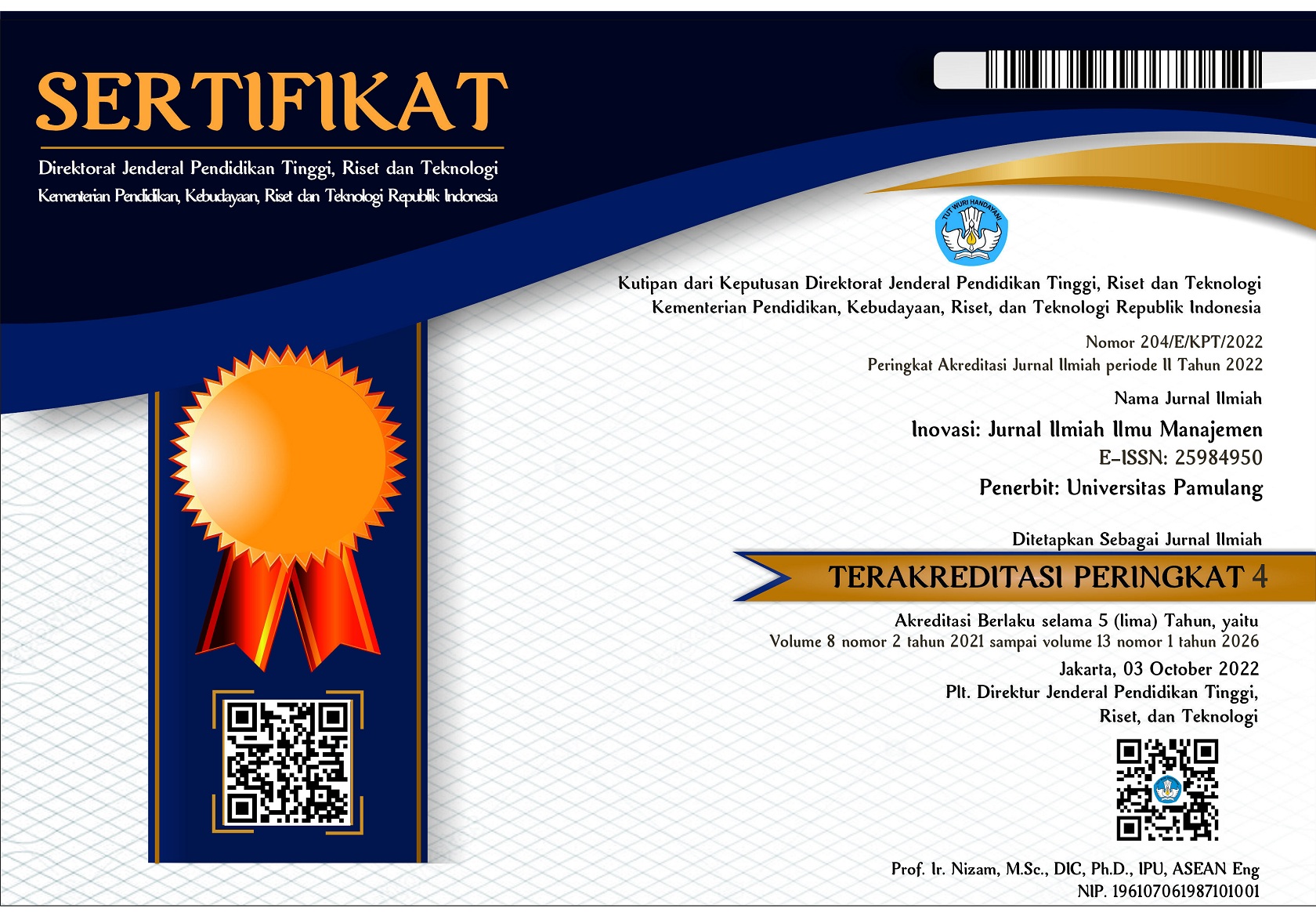OPTIMIZING THE ROLE OF LEADERSHIP AND STRENGTHENING WORK SPIRIT AS AN EFFORT TO INCREASE QUALITY WORK OUTCOMES
DOI:
https://doi.org/10.32493/Inovasi.v8i2.p81-88.21358Abstract
Quality of work is one of the main instruments that show the achievement of performance. For companies, performance is a necessity, which must be realized, as evidence of achieving goals. Therefore, it takes the involvement of all parties, especially the leadership. Leaders have an important role in influencing and inviting all employees to work totally in realizing company goals. In addition, the inherent optimism and enthusiasm is a supporting factor for improving performance. In this regard, this study aims to analyze and explain the possible influence of leadership and work motivation on improving performance. Methodologically, this research is quantitative based using multiple linear regression statistics. In collecting data, a questionnaire method was used, so that the answer scale was obtained. The results showed that the partial and simultaneous statistical results were in the significant category. That is, a good leader can encourage the creation of a productive work environment, an environment that breeds enthusiasm for work, and has a strong desire to give the best results. Likewise, work motivation has a real influence on the psychological state of employees, namely a self-motivation to be able to contribute to the interests of the company.
Keywords: Work Quality, Work Spirit, Leadership Role
References
Harras, H., Sugiarti, E., & Wahyudi, W. (2020). Human Resource Management Studies for Students.
Wahyu, W., & Salam, R. (2020). ORGANIZATIONAL COMMITMENT (Study: Human Resource Management).
Erlangga, MH (2021). The Influence of Leadership and Motivation on Employee Performance of PDAM Tirta Musi Unit Sako Kenten.National Journal of Marketing & HR Management,2(1), 60-68.
Adhan, M., & Prayogi, MA (2021, June). The Role of Employee Performance: Leadership and Work Motivation. InNational Seminar on Social Education Technology and Humanities(Vol. 1, No. 1, pp. 260-274).
Kuruway, M. (2021). THE EFFECT OF LEADERSHIP, MOTIVATION AND JOB SATISFACTION ON EMPLOYEE PERFORMANCE AT THE REGIONAL SECRETARY OFFICE OF MAPPI REGENCY.Journal of Information Systems Management Economics,3(1), 85-92.
Masni, H., Hutabarat, ZS, Andriani, L., & Afriliani, D. (2021). The Influence of Leadership and Achievement Motivation on Teacher Performance.Journal of Education Window,1(04), 226-231.
HR, AH, & Sonny, S. (2021). THE EFFECT OF LEADERSHIP AND MOTIVATION ON EMPLOYEE PERFORMANCE OF FOOD & BEVERAGE DEPARTMENT HOTEL ARYADUTA LIPPO VILLAGE, TANGERANG.Journal of the Renaissance,6(1), 710-720.
Anto, AB, Minawati, T., & Saptarini, V. (2021). THE EFFECT OF LEADERSHIP AND MOTIVATION ON WORK DISCIPLINE AT LAMPUNG PROVINCE REGIONAL PERSONNEL AGENCY.VISIONIST,4(2).
Simatupang, P. (2021). The Influence of Leadership and Motivation on Employee Performance in the Civil Service Police Unit, Central Tapanuli Regency.LITERATUS,3(1), 59-67.
Nuriyah, S., & Azizah, N. (2021). EFFECT OF LEADERSHIP, WORK MOTIVATION AND ORGANIZATIONAL CULTURE ON EMPLOYEE LOYALTY.Journal of Business, Economic, Social and Political Analytics,1(01), 22-31.
Nasrallah, A. (2021). The Influence of Leadership, Education, Motivation and Discipline on Employee Performance at PT. BNI Syariah Kcp Pagar Alam.Journal of Management And Business,10(1), 49-60.
Herlina, HH, Badaruddin, B., & Haeranah, H. (2021). THE EFFECT OF TRANSFORMATIONAL LEADERSHIP, MOTIVATION AND WORK DISCIPLINE ON EMPLOYEE PERFORMANCE IN MANDALLE DISTRICT OFFICE, PANGKAJENE REGENCY AND THE ISLANDS.Journal of Indonesian Nobel Masters in Management,2(4), 638-646.
Herzberg, F. (2017). Motivation to work. Routledge.
Kocman, A., & Weber, G. (2018). Job satisfaction, quality of work life and work motivation in employees with intellectual disability: A systematic review. Journal of Applied Research in Intellectual Disabilities, 31(1), 1-22.
Wijaya, SW, & Anoraga, P. (2021). The Influence of Leadership and Motivation on the Performance of Village Apparatus in Subah Subdistrict, Batang Regency.ECONBANK: Journal of Economics and Banking,3(2), 117-127.
Werdhiastutie, A., Suhariadi, F., & Partiwi, S. G. (2020). Achievement Motivation as Antecedents of Quality Improvement of Organizational Human Resources. Budapest International Research and Critics Institute-Journal (BIRCI-Journal) Volume, 3, 747-752.
McFadden, P., Ross, J., Moriarty, J., Mallett, J., Schroder, H., Ravalier, J., ... & Gillen, P. (2021). The role of coping in the wellbeing and work-related quality of life of UK health and social care workers during COVID-19. International journal of environmental research and public health, 18(2), 815.
Sugiyono. (2016). Quantitative, Qualitative and R&D Research Methods. Bandung: Alphabet
Downloads
Published
How to Cite
Issue
Section
License
Authors who publish with this journal agree to the following terms:
- Authors retain copyright and grant the journal right of first publication with the work simultaneously licensed under a Creative Commons Attribution License that allows others to share the work with an acknowledgement of the work's authorship and initial publication in this journal.
- Authors are able to enter into separate, additional contractual arrangements for the non-exclusive distribution of the journal's published version of the work (e.g., post it to an institutional repository or publish it in a book), with an acknowledgement of its initial publication in this journal.
- Authors are permitted and encouraged to post their work online (e.g., in institutional repositories or on their website) prior to and during the submission process, as it can lead to productive exchanges, as well as earlier and greater citation of published work (See The Effect of Open Access).
INOVASI: journal of managenet have CC-BY-SA or an equivalent license as the optimal license for the publication, distribution, use, and reuse of scholarly work.
In developing strategy and setting priorities, INOVASI: JOURNAL OF MANAGEMENT recognize that free access is better than priced access, libre access is better than free access, and libre under CC-BY-SA or the equivalent is better than libre under more restrictive open licenses. We should achieve what we can when we can. We should not delay achieving free in order to achieve libre, and we should not stop with free when we can achieve libre.









